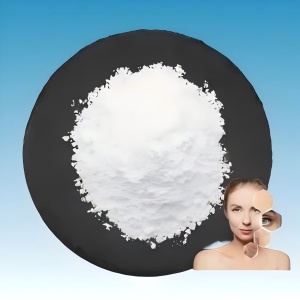Is acetyl hexapeptide-49 natural?

Acetyl hexapeptide-49 is a buzzword in skincare, often found in products promising to soothe sensitive skin and reduce irritation. But is it natural? To answer this, we need to dig into what this ingredient is, how it’s made, and what it does for your skin. This article breaks it down in a way that’s easy to understand, exploring its origins, benefits, and whether it fits the "natural" label that many of us look for in our skincare routines.
What Is Acetyl Hexapeptide-49?
Acetyl hexapeptide-49 is a synthetic peptide, which means it’s a lab-made chain of amino acids designed to mimic natural processes in the skin. It’s often marketed under names like Delisens and is used in cosmetics to calm sensitive skin, reduce itching, and strengthen the skin barrier. Unlike some natural ingredients sourced from plants or animals, this peptide is created through chemical synthesis, a process that links amino acids in a specific order and adds an acetyl group to boost stability and skin penetration. So, right off the bat, it’s clear this isn’t something you’d find growing in a forest or on a farm—it’s engineered in a lab for specific skincare benefits.
Why Isn’t It Considered Natural?
Let’s get to the heart of the question: is acetyl hexapeptide-49 natural? The short answer is no. Natural ingredients are typically derived directly from plants, minerals, or animals with minimal processing—like aloe vera or shea butter. Acetyl hexapeptide-49, however, is a product of chemical synthesis. Scientists build it by combining amino acids in a controlled environment, then modify it with acetylation to make it more effective in skincare products. This process is far from what you’d call "natural," as it relies on advanced technology rather than raw materials from nature. Even though peptides exist in our bodies, the synthetic version is a far cry from something you’d find in the wild.
Benefits for Sensitive Skin
Even if it’s not natural, acetyl hexapeptide-49 has some impressive perks, especially for sensitive skin. It works by regulating the PAR-2 receptor, which helps dial down inflammation and irritation. Studies show it can reduce the production of pro-inflammatory molecules like IL-6 and IL-8 by up to 70% in lab tests, making it a go-to for calming redness or itchiness. It also boosts hydration—some users report a 34% increase in skin moisture after just a week—and helps repair the skin barrier, which is a big deal for conditions like eczema or rosacea. So, while it’s not from Mother Nature, it’s doing some heavy lifting for your skin.
Is It Safe to Use?
Safety is always a concern when you’re slathering something on your face, and acetyl hexapeptide-49 gets a pretty good rap here. It’s considered non-comedogenic, meaning it won’t clog your pores, and side effects are rare. Some folks with super sensitive skin might notice mild redness or stinging, but that’s uncommon. If you’re pregnant or breastfeeding, there’s not much data on this peptide, so it’s smart to check with a doctor before using it. A patch test is always a good idea to make sure it plays nice with your skin. Overall, it’s a safe bet for most people looking to soothe irritation without harsh chemicals.
Why Choose It Over Natural Alternatives?
So, if it’s not natural, why bother? Well, synthetic ingredients like acetyl hexapeptide-49 are often more stable and targeted than their natural counterparts. They’re designed to do one job really well—like reducing inflammation or boosting hydration—without the variability you get with plant-based ingredients. Plus, they can be formulated to penetrate the skin better, delivering results faster. For folks with sensitive skin who need consistent, reliable relief, this peptide can be a game-changer, even if it’s not plucked from a tree. That said, if you’re all about keeping things 100% natural, you might want to stick with ingredients like chamomile or calendula instead.
Final Thoughts on Its Place in Skincare
Acetyl hexapeptide-49 isn’t natural, but that doesn’t mean it’s a bad guy in your skincare routine. Its synthetic nature allows it to be precise, effective, and safe for most users, especially those dealing with sensitive or irritated skin. If you’re okay with lab-made ingredients and want something that can calm your skin and keep it hydrated, this peptide is worth a look. But if you’re set on natural-only products, you’ll probably want to skip it. Either way, knowing what’s in your skincare helps you make choices that feel right for you.
